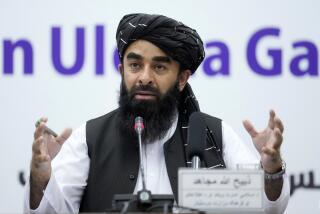U.S. Sees Fall of Afghan Regime as Soviets Leave : Kabul’s Army Called Shaky and Ineffective
- Share via
WASHINGTON — The Reagan Administration bluntly predicted Thursday that the current Soviet-backed regime in Afghanistan headed by President Najibullah will collapse after the Soviet Union pulls its 115,000 troops out of the country.
“Our estimate is that the government could splinter and fall of its own weight even before the final Soviet pullout,” Robert A. Peck, deputy assistant secretary of state, told the House subcommittee on Asia in an extraordinarily candid assessment of the government’s prospects. “ . . . Once the Soviet protectors are gone, the regime will be unable to project power into the countryside, and its early demise will be inevitable.”
Peck called the Afghan army a “shaky, undermanned and ineffective” force.
“Almost all effective fighting has involved use of Soviet ground forces together with Afghans, as well as Soviet air and artillery support. This will be gone once the Soviets start to pull out,” he said.
The prediction of a government collapse helps to explain why the United States has declined to support Pakistan’s effort to have a new coalition government installed in Kabul now, before the Soviet withdrawal begins. Pakistan believes that until the political future of Afghanistan is settled, the 3 million Afghan refugees in Pakistan may not return home and could cause future problems in Pakistan.
U.S. Stressing Pullout
The Administration’s highest priority is seeing the Soviet troops leave the country as soon as possible, without the delays that might be caused by negotiations over the shape of a new government.
On Feb. 8, Soviet leader Mikhail S. Gorbachev announced that the Soviet Union is prepared to withdraw its troops over a 10-month period beginning May 15. Gorbachev said the Soviet withdrawal will take place no matter what happens concerning the future government of Afghanistan.
Gorbachev’s offer was welcomed by the United States, but has been criticized by Afghan resistance groups, which have said they fear he is trying to undercut the resistance groups by cutting off their access to American aid.
Under commitments that the Reagan Administration has made beginning in 1985, once Soviet troops begin to leave Afghanistan and it is clear that the withdrawal is irreversible, the United States would be obliged to cut off the military aid, estimated at more than $600 million a year, to the moujahedeen , or Afghan guerrillas.
In his testimony Thursday, Peck acknowledged that the Soviet Union has made no commitment to cut off supplies to the Afghan regime. He said there is also no arrangement or guarantee under which Afghanistan would become a neutral country, like Austria.
As a result, in the political maneuvering that accompanies the Soviet withdrawal, Najibullah and his supporters would have access to Soviet equipment, while the moujahedeen would be cut off from American backing.
Saudi Aid May Continue
However, Peck hinted broadly that other countries, such as Saudi Arabia, which have aided the Afghan resistance groups in the past, would continue to do so. The obligation to cut off aid, he said, “would relate exclusively to our own policies and actions. We would bear no responsibility for the action of others.”
Order of Withdrawal
A Defense Department official, Vincent M. Cannistraro, told the subcommittee that the Soviet army will probably withdraw troops from western and southern Afghanistan first, and then from areas south and east of Kabul. Once the army withdraws 30% to 50% of its forces, he said, the withdrawal will be “close to being irreversible.”
Cannistraro said the Afghan government has about 40,000 regular army troops, an air force of 7,000, and another 100,000 irregular troops, “including tribal militia of uncertain loyalty.” The moujahedeen , he said, have “as many as 200,000 full-time and part-time fighting forces.”
After the Soviet troops begin to leave, Cannistraro said, the current regime headed by Najibullah “will dominate only a small belt of territory, with Kabul as its epicenter. . . . The regime will remain well armed militarily, facing a resistance force which will probably have limited stocks of military equipment. . . .”
Still, the Pentagon official said, it is possible that the early stages of the Soviet withdrawal will cause “the progressive political collapse of the Soviet client.” Even if this does not happen, he said he doubts that the current regime can survive for long.
More to Read
Sign up for Essential California
The most important California stories and recommendations in your inbox every morning.
You may occasionally receive promotional content from the Los Angeles Times.












